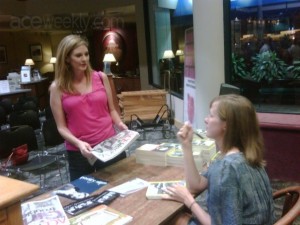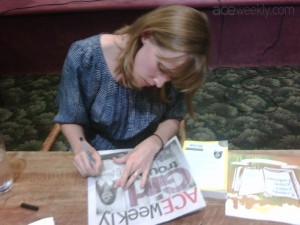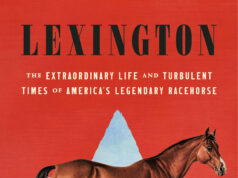BY HOLLY GODDARD JONES
The first time I gave a public reading from my fiction was in 2003. My professor (and fairy godmother), Nikky Finney, invited me to read with her for a series being sponsored by the Good Foods Co-op; the idea was to pair established local writers with the wet-behind-the-ears emerging talent they’d mentored. It was a glorious day. Nikky read from an essay about her grandmother, and I read—well, I can’t recall what I read. But people were warm and supportive, and my husband was there to hug me (and keep me from falling over with nervous relief) when I stepped off stage. I was given a check for some money. I can’t remember how much, perhaps $50 or $100, just that it seemed a fortune then.



I’d brought along copies of my little chapbook of short fiction, Rest Easy, which had been published through a contest sponsored by the Kentucky Writers’ Coalition, and Nikky held one up and announced to the crowd, “Trust me. You are going to want to buy one of these and take it home and put it in a plastic bag and keep it. Just hold on to it. Someday it will be worth something.” I went on to sell every chapbook, adding another 50 or 100 bucks to my draw for the night, and I sat at a table right alongside Nikky, signing those babies like the professional writer I hoped with all my heart I’d someday be. Yep, a glorious day.
But every now and then I think about those chapbooks, and I wonder if anyone held on to a copy as Nikky suggested they should, and my blood runs cold. It’s partly because I’d hate to be judged by those stories, written when I was 19 and 20, committed to print before I’d matured enough to realize that I’d someday know more and write better. But mostly I worry about the inscriptions. Even in the thrill of that golden afternoon in the limelight, even as I dazedly sat beside this woman who rendered me awestruck years before she won the NBA and started rendering everyone, including John Lithgow, awestruck, I was filled with nervous dread about signing the chapbooks. What to write? I hadn’t planned, I hadn’t practiced—I hadn’t believed I’d sell a couple of copies, much less all of them. I felt for the first time the complicated mix of emotions I feel each time now that I set my pen to a copy of a book with my name on the cover: pathetically grateful, flummoxed, blank-headed, and unworthy. A human being spent good money for my words! What on earth can I say to honor that?
My impulse that day—and it continues, mortifyingly, to be my impulse—was to write long, effusive, obsequious notes that attempted to fabricate a personal connection to a person I’d known for all of a few minutes. It was as if I were signing high school yearbooks, not chapbooks, and I fear that I wrote some things such as, Thank you so much for coming out tonight and supporting literary fiction and It was SO nice to meet you, and I hope our paths will someday cross again! Here’s my email address! I fear I wrote those things then because I continue to write those things now, even when I coach myself before a reading to not do it. It just happens. My pen starts moving, and before I know it, I’ve covered the title page with clichés and exclamation points. Lots of exclamation points.
“Wow!” a young woman at a college once said after I’d signed her book, looking at the inscription warily, as if she thought I was coming on to her. “It’s so long!” And indeed, I’d spent more time signing her book than we’d spent in conversation, trying to take all I’d learned from her in our short acquaintance (that she was an English major, that she liked writing stories) and make her feel not just my gratitude, but that she was right to spend her money on my book of stories. The problem, I think, is that I tend to be at my absolute lowest after I give a reading. I finish, close the book to polite applause, and think, Good lord, someone published this? Each book that stays in the stack, destined for a return to my publisher, feels like a confirmation of my shittiness; each book sold is a reason to not give up. It’s a wonder I don’t grab and hug every person who hands me a book to sign.
Perusing my bookshelf, I pull some signed copies of books by people who aren’t friends or colleagues, just to remind myself of what they wrote, and this is what I come up with: “For Holly, Thanks + Best Wishes”; “For Holly—With thanks + all good wishes—”; and “For Holly—With my very best wishes always.” Plus some signatures and dates and sometimes that cryptic secret author code (which I have adopted, just because everyone else is doing it, with no grasp of what it means) in which the author draws a slash through her name. It could be so straightforward! So easy! So why do I always, always over think it?
I should be honest here: I’ve signed a few “Thanks and best wishes” in my day. But if my long, bubbly inscriptions leave me feeling amateurish and embarrassed, my breezy inscriptions are worse. They come across as disinterested and superior. Anonymous.
This weekend, I decided to spend my extra hour from Daylight Savings wandering around one of the local antique malls. Scanning the used books in one particularly well-stocked booth, I found hardcover editions of novels by three local writers, each of whom I know personally. All three were signed. Two were personally inscribed. The two with personal inscriptions read, “With all best wishes” and “With best wishes”; what’s more, I wrote all of the essay that precedes this paragraph before the trip to the antique mall, and was struggling to find the right sentiment to end it on, so it was especially funny to stumble upon those “best wishes,” to see Signed Copy penciled in on the endpapers, as if that increased the book’s value.


So maybe that will be my go-to inscription for the new book, which comes out next year: Thank God for you. I don’t always have the right words, on the spot, to express my gratitude to my readers, but I wish them more than the best, because they’re the reason I get to do what I do. If I’m a little more effusive, sometimes, than what seems cool or appropriate, that’s the reason.
And if you someday sell my inscribed book to an antique mall, well, that’s OK, too. Please just white out the embarrassing parts first.
—
Holly Goddard Jones is the author of The Next Time You See Me, which will be released February 12, 2013, and Girl Trouble: Stories. A Kentucky native and UK grad, she now lives in Greensboro, NC.
[amazon asin=0061776300&template=iframe image]
RELATED POSTS
Holly Goddard Jones, Girl Trouble, 9.09.2009
Holly Goddard Jones Recounts her Book Tour So Far Ace October 4, 2009
TV or not TV: Holly Goddard Jones Remembers Dixie Carter Ace May 13, 2010









